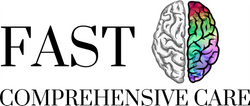Empowering Your Health, Mind, and Life
Your Health, Our Priority - Fast Comprehensive Care Serving Nevada, MO, and Harrisonville, MO
At Fast Comprehensive Care, we encompass health problems and provide treatment beyond mere physical levels to include lifestyle adjustments and psychotherapy to improve psychological resilience. Many overwhelmed clients are forced to see a therapist, psychologist, psychiatrist, and primary care doctor. Here at FCC, we can simplify the process and provide the comprehensive health expertise you seek. Together, we can address your physical, psychological, and chemical needs. We take a comprehensive approach to caring for your overall health and well-being. Unlike many other mental health clinics, we understand how physical illnesses may impact your emotional health. Call our Nevada, MO, office at
(417) 667-8352 or our Harrisonville, MO, office at
(816) 380-4010.
Why Work with Us?
Integrated Care
At FCC, we believe in the synergy between physical and emotional health. Our professionals collaborate to ensure your physical illnesses are not overlooked, as they may impact your emotional well-being.
Personal Care and Empowering Resilience
Every patient is unique; we tailor care plans to fit your needs. You are not just a number to us but an active participant in your healthcare journey. Our focus is not only on treating symptoms but also on empowering you to build resilience. Through psychotherapy and lifestyle adjustments, we equip you with coping skills and strategies for lasting well-being.
Holistic Wellness
We treat the whole person, not just the symptoms or the disease. We emphasize preventive measures and lifestyle changes to support health and wellness. We recognize the influence of social and environmental factors on an individual's well-being. We acknowledge the importance of mental and emotional health in physical health outcomes. We encourage self-awareness, self-care, and self-empowerment.
Spravato: Innovative Treatment for Depression
What is Spravato?
Spravato (esketamine) is a groundbreaking medication approved by the FDA for the treatment of major depressive disorder (MDD) in adults who have not found relief with other antidepressant treatments. Administered as a nasal spray, Spravato offers a new approach to managing depression, particularly for those with treatment-resistant depression (TRD).
How Does Spravato Work?
Spravato works differently from traditional antidepressants. It targets the NMDA receptor in the brain, which is thought to play a role in mood regulation and depression. By modulating this receptor, Spravato can help alleviate depressive symptoms more rapidly than conventional antidepressants, which often take weeks to show effects.
Who Can Benefit from Spravato?
Spravato is specifically designed for adults with:
- Major depressive disorder (MDD) who have not responded adequately to at least two different antidepressant treatments.
- Depressive symptoms in adults with MDD who are experiencing suicidal thoughts or behaviors.
What to Expect During Treatment
Spravato is administered under the supervision of a healthcare professional in a certified treatment center. The treatment process includes:
- Initial Assessment: A thorough evaluation to determine if Spravato is the right option for you.
- Administration: Spravato is given as a nasal spray, and you will be monitored for at least two hours after each dose to ensure safety and manage any potential side effects.
- Follow-Up: Regular follow-up appointments to assess your progress and adjust treatment as necessary.
SPRAVATO at Fast Comprehensive Care
Benefits of Spravato
- Rapid Relief: Many patients experience a reduction in depressive symptoms within hours to days.
- Effective for TRD: Provides a new option for those who have not found success with other treatments.
- Convenient Administration: Delivered via nasal spray, making it less invasive than some other treatment options.
Success Rates and Statistics
· Rapid Onset of Action: Clinical trials have shown that some patients experience significant improvement in depressive symptoms within 24 hours of the first dose.
· Response Rates: Approximately 70% of patients with treatment-resistant depression respond to Spravato when used in conjunction with an oral antidepressant, compared to about 52% who respond to oral antidepressants alone.
· Remission Rates: Around 52% of patients achieve remission (minimal or no symptoms) after four weeks of treatment with Spravato, compared to 31% with oral antidepressants alone.
Potential Side Effects
As with any medication, Spravato may cause side effects. Common side effects include:
- Dizziness
- Nausea
- Increased blood pressure
- Dissociation (feeling disconnected from reality)
Your healthcare provider will discuss all potential risks and benefits with you before starting treatment.
Why Choose Fast Comprehensive Care for Spravato Treatment?
At Fast Comprehensive Care, we are committed to providing cutting-edge treatments and compassionate care. Our team of experienced professionals is dedicated to helping you find the most effective solutions for managing depression. With our comprehensive approach, you can expect personalized care tailored to your unique needs.
To take the next step, call our Nevada, MO, office at (417) 667-8352 or our Harrisonville, MO, office at (816) 380-4010.





